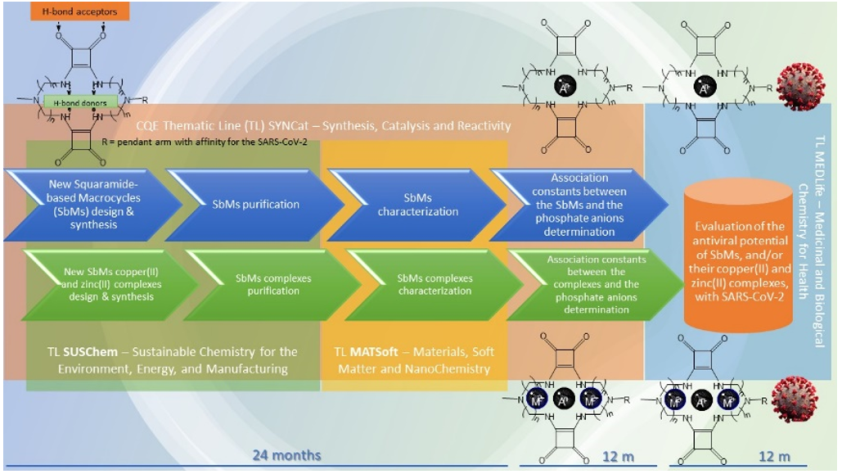
Doctoral Themes - Proposals
Development of squaramide-based macrocycles as potential antivirals against SARS-CoV-2
Supervisors
Catarina V. Esteves, caesteves@ciencias.ulisboa.pt
Maria de Fátima Minas da Piedade, mdpiedade@ciencias.ulisboa.pt
Registration Institution
Faculdade de Ciências (Universidade de Lisboa)
Project description
The outbreak of Severe Acute Respiratory Syndrome Coronavirus 2 (SARS-CoV-2), which resulted in the COVID-19 pandemic that has been wrecking general well-being and economic stability, poses to the scientific community several challenges and fundamental questions. One of such questions is: Which drug will be effective against SARS-CoV-2? To answer this question, researchers are putting together a list of available drugs that might work against SARS-CoV-2. Meanwhile, infected people are being treated with combined therapeutics using repurposed antiviral drugs, such as remdesivir. This drug was originally developed in 2009, to treat hepatitis C and respiratory syncytial virus (RSV), later on repurposed as an antiviral for Ebola virus and Marburg virus, and now used to treat COVID-19.
With the present research plan, the development of squaramide-based macrocycles that could act as antivirals against SARS-CoV-2, is proposed. Squaric acid and its many derivatives have been thoroughly studied by the scientific community throughout the years, resulting in a considerable body of work, able to support future investigations. Particularly, such family of compounds have been studied as antiviral agents with promising results. The study of the phase purity of the synthesised drugs is also envisaged to investigate the existence of different polymorphs, which may result in diverse observable properties on the obtained compounds. In the case of the known antiviral, ritonavir, its molecules crystallized first in one form, known as form I, and then, a new lower free energy form appeared, form II. This polymorph, which was more stable, presented a different crystalline arrangement, which impacted negatively the solubility of the drug. With that, the bioavailability was affected, and the drug had to face temporary market withdrawal, until a solution was found, resulting in human and financial losses.
Keywords
SARS-CoV-2; Antivirals; Macrocycles; Squaramides; Polymorphism
Societal Challenges
This research plan complies with goals 3 and 4 of 2030 Agenda. With the development of squaramide-based macrocycles, as potential antivirals against SARS-CoV-2, this project ought to have a direct impact on the available alternatives to tackle the COVID-19 pandemic, ultimately contributing to “Ensure healthy lives and promote well-being for all at all ages” (goal 3).
Furthermore, within this research plan, the supervision and mentoring of students at all levels is envisaged, as is the dissemination of the research outcomes, both in a formal and informal fashion, which will contribute to “Ensure inclusive and equitable quality education and promote lifelong learning opportunities for all” (goal 4).

Check other proposals from this and the other thematic lines:




